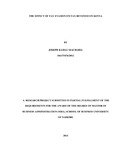| dc.description.abstract | Tax payment is a civic duty and an imposed contribution by the government to contribute
to her principal source of revenue to provide public goods and services to its citizenry. It
is a compulsory unrequited payment to the Government. Tax evasion prevalence is vast
and greatly impairs taxation‟s macro- economic objectives thus creating a gulf between
actual and potential government tax revenue raising many issues which need urgent
attention and solutions. However much the government endeavors to exercise its
sovereign right to collect taxes, nobody likes paying taxes although there is great
appreciation that taxes need to be paid and this drives some people into tax evasion
making the government constantly fail to raise targeted tax revenue. The study sought to
establish how tax evasion affects tax revenues in Kenya. The study employed a survey
research design which involved collection of information from a sample of individuals
through response to questions. The study targeted 50 tax evaders investigated by Kenya
Revenue Authority. The study relied on secondary data informed by KRA investigated
cases, related materials published by government authorities, organizations such as Tax
Justice Network, work of other researchers and authors in the form of journals, books,
bulletins and newspapers articles as well as sources from the internet. The researcher
used quantitative methods to quantify the problem by way of generating numerical data.
A regression analysis was used to identify the effect of tax evasion on tax revenue. From
the regression model, the study found out that there were factors influencing tax revenue
in Kenya, which are total tax evasions, money supply, GDP per capita and exchange rate.
They either influenced it positively or negatively. The study found out that the intercept
was 0.861 for all years. The four independent variables that were studied (total tax
evasions, money supply, GDP per capita and exchange rate) explain a substantial 74.2%
of tax revenue in Kenya with equity as represented by adjusted R2 (0.742). The study
established that the coefficient for total tax evasions was -0.728, meaning that total tax
evasions negatively but significantly influenced the tax revenue in Kenya. The study
therefore concluded that tax evasion negatively but significantly affects tax revenue in
Kenya. The study recommended that due to the potential negative effects of tax evasion
on tax revenues in Kenya, new policy guidelines contained in the budget speeches and
other tax policy documents should be implemented, as a matter of urgency, almost
immediately. | en_US |

